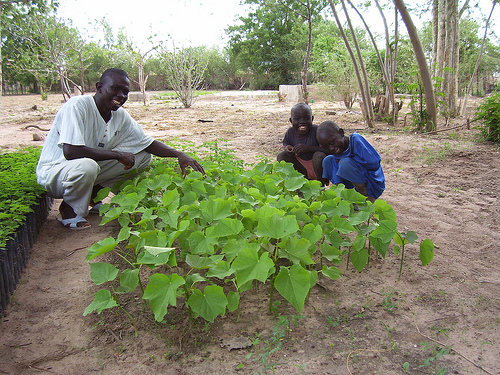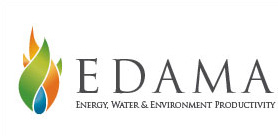As African nations sell and lease its land, and birthright, to the world’s super-powers, and arguably “dangerous” countries like Saudi Arabia who support Islamic fundamentalism, we are seeing a brand new kind of neo-colonial land-grab, and it scares me.
I’d reported on Galten’s Jatropha seeds for biofuel here, and also on the Israeli conglomerate Ormat, Evogene and Leviev in Namibia planting castor seeds for biofuel, and came out thinking, naively perhaps, that land development for biofuels in Africa was a beautiful thing: Israel doesn’t have much arable land, and the projects create jobs for Africans as well.
Israel is not the only Western country buying into Africa:
- Britain‘s Sun Biofuels plans to grow about 5,500 hectares of jatropha in Tanzania. The company also grows jatropha in Ethiopia and has similar projects in Mozambique.
- Sweden‘s Sekab Group, one of Europe’s leading ethanol producers, plans to produce 100 million litres of ethanol a year in Tanzania by 2012 at a cost of $200 – $300 million.
- British-based energy firm CAMS Group said in September it planned to produce 240 million litres of ethanol a year from sweet sorghum in Tanzania at a cost of up to $600 million.
- British biofuel company, D1-BP Fuel Crops is also actively planting Jatropha in Swaziland and Zambia, and also has plantings in Madagascar.
- In November 2008, South Korea’s Daewoo Logistics secured a 99-year lease on 1.3m hectares of land, an area roughly half the size of Belgium, from the government of Madagascar. (This equals about half of Madagascar’s arable land!)
- Flora EcoPower of Germany, through a local subsidiary, of 8,000 hectares in Oromia province in Ethiopia for the cultivation of castor seeds.
Now I am not a huge follower of crazy conspiracy theories, but something has me a little paranoid about new and aggressive land buying and leasing in Africa, especially when I hear countries like Saudi Arabia (15 of the 19 9/11 hijackers were Saudis), are buying up land in Sudan for agricultural development. Gulf nations are cash-heavy, but water-poor and are looking to secure food and fuel resources on Africa’s land for the coming decades.
It’s Like The Gold Rush
New patterns of land use in Africa, and what’s being called an aggressive “land-grab” according to AfricaAsia.com, opens up some serious questions for environmentalists and policy makers to think about. I’m not mongering doom and gloom: the results could be good too: It’s possible that agricultural development for food and biofuels in countries like Sudan, Egypt and Ethiopia could create more political stability and wealth for its indigenous people.
But I hazard to guess that sharing the profits equally with the Africans isn’t really on the landlords’ minds.
I fear, the only ones who’ll be reaping the big rewards, like coffee and diamond exporters mainly do, will be the big companies doing the colonizing. It is also likely, inevitable, and quite scary that some of these massive players will take their political points of view and baggage with them too.
Consider some of the Middle East players:
- In August 2008, Al-Qudra Holdings of Abu Dhabi said that it was looking to acquire 400,000 hectares of land in Asia and Africa, with Sudan a likely candidate, for the cultivation of corn, rice and cattle. The company already farms 1,500 hectares in Morocco and Algeria.
- Saudi Arabia and the United Arab Emirates have already acquired substantial holdings in Sudan.
- The Abu Dhabi Fund for Development alone is set to cultivate some 30,000 hectares of land in the north of Sudan.
- Hadco, of Saudi Arabia, is investing more than $96m in Sudan to lease 10,000 hectares on the banks of the Nile, near Khartoum, to produce wheat, vegetables and fodder.
According to AfricaAsia.com there have been similar investments in Mozambique, Uganda and Zimbabwe. And Ethiopia’s Prime Minister, Meles Zenawi, has been actively soliciting Middle East investment countries, describing himself as “very eager” to attract further land deals.
Here at Green Prophet, I work to give fair “green” value and criticism to all countries in the Middle East; the fact that countries like Saudi Arabia who support the Taliban and al Qaeda, are also buying land in Africa for agricultural development, deeply worries me.
InformationClearinghouse.net (in general highly critical of Israel, the US and the West) comments:”Backed by their governments and bankrolled with huge trade and investment profits and budget surpluses, the newly emerging neo-colonial economic powers (ENEP) are seizing control of vast tracts of fertile lands from poor countries in Africa, Asia and Latin America, through the intermediation of local corrupt, free-market regimes.
“Millions of acres of land have been granted – in most cases free of charge – to the ENEP who, at most, promise to invest millions in infrastructure to facilitate the transfer of their plundered agricultural products to their own home markets and to pay the ongoing wage of less than $1 dollar a day to the destitute local peasants.”
“Projects and agreements between the ENEP and pliant neo-colonial regimes are in the works to expand imperial land takeovers to cover additional tens of millions of hectares of farmland in the very near future. The great land sell-off/transfer takes place at a time and in places where landless peasants are growing in number, small farmers are being forcibly displaced by the neo-colonial state and bankrupted through debt and lack of affordable credit. Millions of organized landless peasants and rural workers struggling for cultivatable land are criminalized, repressed, assassinated or jailed and their families are driven into disease-ridden urban slums. The historic context, economic actors and methods of agro-business empire-building bears similarities and differences with the old-style empire building of the past centuries.”
The above point-of-view may be a bit extreme (and the site insanely anti-Israel), but what I would like the commentary above and this post to do in general, is to encourage more people, reporters and environment bloggers to look with a critical eye at what’s happening in Africa with regards to foreign land leases, investments and development. It’s worrisome to think that without any controls, the massively rich nations will be getting richer and stronger, while the Africans and the weaker ones . . . you know already how this story ends.
For a great background piece on what’s happening with water in Madagascar, and the region in general, read Green Prophet’s interview with film producer Courtney Nichols.
::Reuters
::Africasia.com
More on biofuel:
Galten’s Jatropha seeds for Biofuel
Ormat, Evogene and Leviev in Namibia Planting Castor Seeds for Biofuel
Green Energy or Greenwash In Israel
(Image credit: treesftf)
Like reading about green news from the Middle East? Want more of this more often? Subscribe to Green Prophet here.





I think you are being a little un fair and generalising too much. The Arabs are not all wealthy and wastful, there are a lot of families in Saudi Arabia struggling to get by and meet the needs of their families. And having lived here in Saudi Arabia for the past five years I also do not consider it to be a supporter of al-qaeda or the taliban. Since when do the actions of a few stand to represent a whole and diverse nation?. Food prices here continue to rise due to stortages and wages remain stagnant, un employment is extremely high . So i would ask for a fairer analysis looking into both sides more throughly and with less bias.
Nicola,
I appreciate your comments.
Up to now None of the FDI in African countries are having any successful projects of eenrgy plantation.
Most of the investment are more or rest just some small candy money for the experimental project.
It is hard yo say that there are really teh serious companies to invest in the African country.
The talk/vision of all eenrgy croping projects are very big.
But the execution is almost invisible.
It is the time to ask for the seriousness of the investment for this bioenergy crops
There are so many talk about the energy crop but in the reality is completely different.
More vision of the energy crop alla round the world and if we would sum up all teh willing to plant acreages We dio need to have eh available land 10 time bigger than the available land on our earth.
D1BP is one of the NATO (No Action Talk Only) who did released so many news in the past many years.
Upto today there is almost no single drop of Jatropha Oil used by BP in the BDF market.
D1 have to close down completely their BDF plant because of the supply of the feeds tock which they claimed from day one they enetred into teh jatropha community ti be the world leading Jatropha BDF provider but it end up with closing down the BDF operation
All the failure of the big is only to build up the image of green energy without any real and serious action plan to im plement.
It should be teh time to take teh reala ction
.
Talk Less and Do more for jatropha.
.
Re, Farmersandsoldiers.
I am so disappointed in the Arab world for ignoring Africa the mother land. There is so much wealth in the oil producing countries and the wasteful opulence of the lifestyle of Arab leaders all over Europe, it saddens me to see all the waste and selfishness of the Arabs with their wealth while Africa, the continent where the Prophets where heralded still struggles to gain a footing into the 21 century. One has only to look at Dubai and Saudi Arabia, their swiss bank accounts are overflowing, their toilets are cast in gold, their cities are wastefully grand, their vacation homes all over the world cost millions, while Africa starves and stumbles. The children perish. How much wealth can a man take to the grave? Many of the Phophets have said that this earth is the vineyard of the (one)Lord our creator and we collectively must treat the earth as one estate. Africa needs roads, schools, hospitals, technical training centers, argri-schools, institutions of higher learning, and most of all people who are willing to help without stealing whats left of the countries resources. The world needs more people like Bill Gates, he puts his money where his heart is and does not ask for gold, diamond or silver. May he be blessed in heaven. CVS
For us By us
The people of Africa need to do for self by self, we don’t need the European dollar we need healing thru unity and then can we do business with the rest of the world, Africa being for sale will only cause more division as that of Kenya and its neighbor who both share part in dairy production. Is it impossible for African people to live with out the mighty dollar? No, in fact, Living without the European dollar would bring colonialism to a halt in Africa. We as Africans have never been a people of excess, we have always been blessed with enough hense why all these countries are here to collect. First they robbed Egypt for its gold now its the rest of the rich land of Africa.
We need not do business for wealth and status but to redeem Africa and its descendants from the grip of the Colonialism and the root of the rest of the evils “Dollarism”
Louisiana Enacts the Most Comprehensive Advanced Biofuel Legislation in the Nation
__________________
Advanced Biofuel Industry Development Initiative Benefits Consumers,
Farmers and Gas Station Owners with Localized “Field-to-Pump” Strategy
Governor Bobby Jindal has signed into law the Advanced Biofuel Industry Development Initiative, the most comprehensive and far-reaching state legislation in the nation enacted to develop a statewide advanced biofuel industry. Louisiana is the first state to enact alternative transportation fuel legislation that includes a variable blending pump pilot program and a hydrous ethanol pilot program.
Field-to-Pump Strategy
The legislature found that the proper development of an advanced biofuel industry in Louisiana requires implementation of the following comprehensive “field-to-pump” strategy developed by Renergie, Inc.:
(1) Feedstock Other Than Corn
(a) derived solely from Louisiana harvested crops;
(b) capable of an annual yield of at least 600 gallons of ethanol per acre;
(c) requiring no more than one-half of the water required to grow corn;
(d) tolerant to high temperature and waterlogging;
(e) resistant to drought and saline-alkaline soils;
(f) capable of being grown in marginal soils, ranging from heavy clay to light sand;
(g) requiring no more than one-third of the nitrogen required to grow corn, thereby reducing the risk of contamination of the waters of the state; and
(h) requiring no more than one-half of the energy necessary to convert corn into ethanol.
(2) Decentralized Network of Small Advanced Biofuel Manufacturing Facilities
Smaller is better. The distributed nature of a small advanced biofuel manufacturing facility network reduces feedstock supply risk, does not burden local water supplies and provides for broader based economic development. Each advanced biofuel manufacturing facility operating in Louisiana will produce no less than 5 million gallons of advanced biofuel per year and no more than 15 million gallons of advanced biofuel per year.
(3) Market Expansion
Advanced biofuel supply and demand shall be expanded beyond the 10% blend market by blending fuel-grade anhydrous ethanol with gasoline at the gas station pump. Variable blending pumps, directly installed and operated at local gas stations by a qualified small advanced biofuel manufacturing facility, shall offer the consumer a less expensive substitute for unleaded gasoline in the form of E10, E20, E30 and E85.
Pilot Programs
(1) Advanced Biofuel Variable Blending Pumps – The blending of fuels with advanced biofuel percentages between 10 percent and 85 percent will be permitted on a trial basis until January 1, 2012. During this period the Louisiana Department of Agriculture and Forestry Division of Weights & Measures will monitor the equipment used to dispense the ethanol blends to ascertain that the equipment is suitable and capable of producing an accurate measurement.
(2) Hydrous Ethanol – The use of hydrous ethanol blends of E10, E20, E30 and E85 in motor vehicles specifically selected for test purposes will be permitted on a trial basis until January 1, 2012. During this period the Louisiana Department of Agriculture and Forestry Division of Weights & Measures will monitor the performance of the motor vehicles. The hydrous blends will be tested for blend optimization with respect to fuel consumption and engine emissions. Preliminary tests conducted in Europe have proven that the use of hydrous ethanol, which eliminates the need for the hydrous-to-anhydrous dehydration processing step, results in an energy savings of between ten percent and forty-five percent during processing, a four percent product volume increase, higher mileage per gallon, a cleaner engine interior, and a reduction in greenhouse gas emissions.
Act No. 382, entitled “The Advanced Biofuel Industry Development Initiative,” was co-authored by 27 members of the Legislature. The original bill was drafted by Renergie, Inc. Representative Jonathan W. Perry (R – District 47), with the support of Senator Nick Gautreaux (D – District 26), was the primary author of the bill. Reflecting on the signing of Act No. 382 into law, Brian J. Donovan, CEO of Renergie, Inc. said, “I am pleased that the legislature and governor of the great State of Louisiana have chosen to lead the nation in moving ethanol beyond being just a blending component in gasoline to a fuel that is more economical, cleaner, renewable, and more efficient than unleaded gasoline. The two pilot programs, providing for an advanced biofuel variable blending pump trial and a hydrous ethanol trial, established by the State of Louisiana should be adopted by each and every state in our country.”
State Agencies Must Purchase or Lease Vehicles That Use Alternative Fuels
Louisiana’s Advanced Biofuel Industry Development Initiative further states, “The commissioner of administration shall not purchase or lease any motor vehicle for use by any state agency unless that vehicle is capable of and equipped for using an alternative fuel that results in lower emissions of oxides of nitrogen, volatile organic compounds, carbon monoxide, or particulates or any combination thereof that meet or exceed federal Clean Air Act standards.”
Advanced Biofuel Price Preference for State Agencies
Louisiana’s Advanced Biofuel Industry Development Initiative provides that a governmental body, state educational institution, or instrumentality of the state that performs essential governmental functions on a statewide or local basis is entitled to purchase E20, E30 or E85 advanced biofuel at a price equal to fifteen percent (15%) less per gallon than the price of unleaded gasoline for use in any motor vehicle.
Economic Benefits
The development of an advanced biofuel industry will help rebuild the local and regional economies devastated as a result of hurricanes Katrina and Rita by providing:
(1) increased value to the feedstock crops which will benefit local farmers and provide more revenue to the local community;
(2) increased investments in plants and equipment which will stimulate the local economy by providing construction jobs initially and the chance for full-time employment after the plant is completed;
(3) secondary employment as associated industries develop due to plant co-products becoming available at a competitive price; and
4) increased local and state revenues collected from plant operations will stimulate local and state tax revenues and provide funds for improvements to the community and to the region.
“Representative Perry and Senator Gautreaux have worked tirelessly to craft comprehensive advanced biofuel legislation which will maximize rural development, benefit consumers, farmers and gas station owners while also protecting the environment and reducing the burden on local water supplies,” said Donovan. “Representative Perry, Senator Gautreaux, and Dr. Strain, Commissioner of the Louisiana Department of Agriculture and Forestry, should be praised for their leadership on this issue.”
About Renergie
Renergie was formed by Ms. Meaghan M. Donovan on March 22, 2006 for the purpose of raising capital to develop, construct, own and operate a network of ten ethanol plants in the parishes of the State of Louisiana which were devastated by hurricanes Katrina and Rita. Each ethanol plant will have a production capacity of five million gallons per year (5 MGY) of fuel-grade ethanol. Renergie’s “field-to-pump” strategy is to produce non-corn ethanol locally and directly market non-corn ethanol locally. On February 26, 2008, Renergie was one of 8 recipients, selected from 139 grant applicants, to share $12.5 million from the Florida Department of Environmental Protection’s Renewable Energy Technologies Grants Program. Renergie received $1,500,483 (partial funding) in grant money to design and build Florida’s first ethanol plant capable of producing fuel-grade ethanol solely from sweet sorghum juice. On April 2, 2008, Enterprise Florida, Inc., the state’s economic development organization, selected Renergie as one of Florida’s most innovative technology companies in the alternative energy sector. By blending fuel-grade ethanol with gasoline at the gas station pump, Renergie will offer the consumer a fuel that is more economical, cleaner, renewable, and more efficient than unleaded gasoline. Moreover, the Renergie project will mark the first time that Louisiana farmers will share in the profits realized from the sale of value-added products made from their crops.
Please feel free to visit Renergie’s weblog (renergie.wordpress.com) for more information.